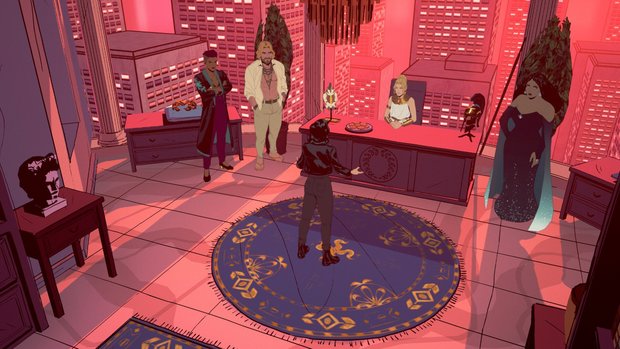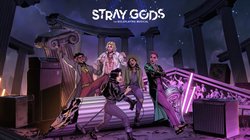Stray Gods: The Roleplaying Musical review

- 1 Comment
Inspired modern fantasy narrative experience is light on gameplay but rarely takes a wrong step
As someone without any musical talent, I find the Muses of Greek mythology to be a special kind of god. Being able to sing or play instruments in an inspirational way would be a dream come true, but as the protagonist in Stray Gods: The Roleplaying Musical learns, that kind of ability can be both a blessing and a curse. As its name suggests, the game is a combination of narrative RPG and musical, where you decide the flow of conversation and your choice of song lyrics influence the direction of the story, including the fate of the protagonist and the world around her. With a great cast and great tunes, it’s a unique and interesting reimagination of Greek mythology for those who aren’t too played out with the concept already.
Stray Gods is a modern-day adventure starring Grace, a directionless twenty-something who meets and befriends Calliope, the last of the Muses, and then unexpectedly inherits her power when Calliope shows up and dies on her doorstep. Thus, Grace is thrust into the world of the Idols (the game’s term for the Greek gods) and forced to investigate and solve Calliope’s murder, clearing her own name as the primary suspect in the process. Along the way she meets figures like Apollo, Persephone, the Minotaur and many other familiar figures from Greek myth as we’ve never seen them before, as she gets to know this fractured and emotionally scarred community that has survived for millennia.

Grace is a compelling protagonist who drives the story along at a decent pace. While she’s not a warm and bubbly person, her genuine concern for her friends and the Idols is evident and makes it easy to empathize with her. Due to the nature of the story, you can choose to play Grace in several different ways. Split into three paths (blue, green and red), the game lets you emphasize her intelligence and mystery-solving abilities, her warmth and people skills, or her kickass side, respectively.
When first starting out, you can choose one strength to concentrate on, then select one more later on. However, within those paths, each conversation offers a host of different dialogue options for you to pick (or not pick) and change the way Grace interacts with the people around her. For the strengths that you don’t pick, the game lets you see the greyed-out dialogue options that you would have been able to use, and can try in future playthroughs. Most decisions don’t impact the direction of the narrative in a big way, but they add replayability and an interesting layer to all of your interactions.
The biggest changes in the story come when Grace is singing. As befitting a Muse, her powers come through music, and she can draw other characters into her songs, forcing them to reveal their true feelings. This is the most unique part of playing Stray Gods, as you can choose different dialogue options mid-song, changing the songs themselves and their outcomes. As a musical theater nerd, it was amazing to me to see how it was built into the gameplay with all of the options flowing together so seamlessly.
Stray Gods has an interesting cast of characters: From Athena, leader of the Idols, to Aphrodite the Goddess of Love, everyone is hiding secrets and working to further their own agendas, such as the continued survival of the Idols or their own reincarnation. Four of the characters – Apollo, Freddie, Persephone and Pan – are also potentially romance options for Grace to pursue. By far my favorite character is Freddie, mainly for being the most upbeat. She’s not an Idol but she jumps into Grace’s new world-altering circumstances head first in order to help her best friend prove her innocence. On the other side of the scale, Pan, voiced by the incomparable Khary Payton, is slimy and scheming and oh so entertaining. He’s chaotic, as he should be, and tries to manipulate everyone and everything, which can have mixed results depending on Grace’s actions.

The songs here are beautiful, as expected from a songwriting team of Tripod and Montaigne, with renowned composer Austin Wintory scoring the game. Along with Payton, the other voice actors are all accomplished singers, from Laura Bailey as Grace to Ashley Johnson as Calliope, as well as Merle Dandrige as Aphrodite. Everyone sings their hearts out, and it’s a fantastic set of performances from start to finish. Most of the songs are slower, ballad-like numbers, such as Grace and Calliope’s duet “Adrift,” the first song of the game. There’s also a heavy jazz and blues influence throughout, particularly in Persephone’s “Challenging a Queen.” On the other end, Orpheus conveys a distinctive rock influence, as befits his voice actor, Rent’s Anthony Rapp.
The art of Stray Gods has a distinct comic book influence, with heavy lines and shadows giving depth to sweeping landscapes and beautiful sets. From Hecate’s library—a massive tower filled with books, storage cabinets and curios that gives a sense of the forbidding and ancient history of the Idols—to the Underworld, painted in watery teal hues and occupied by the pale, ghostly shades and even greyer ruins, each location is visually distinct and interesting. The game isn’t animated in a traditional way, but works closer to a motion comic, using individual changes to show the characters’ movements rather than a smooth and continuous style. It works well with the graphic novel aesthetic and really serves to focus on the details of little movements, such as a character opening their eyes or picking something up.
The actual mystery-solving portion of the game and its storyline are almost entirely handled in the style of a visual novel rather than a traditional adventure game, with just a few brief exploratory sections. There’s no actual detective work involved; instead you’re just carried along with the investigation, as opposed to having to solve puzzles or figure out who the culprit is. You do get answers to these questions at the end and find out how and why Calliope was murdered, but no real thinking is required to get there. No matter which choices you make along the way, you eventually get to the same destination.
In terms of downsides, once you accept the lack of much gameplay there’s really not much to criticize about Stray Gods. Everything is crafted together so elegantly, and with so much thought and purpose throughout its 6-8 hours of play time. The only thing I found myself resenting is that later in the story, a character's fate is directly linked to whether you’re pursuing them romantically, regardless of how close a friendship the two of you develop. I understand the choice from a writer’s perspective, but as an asexual, I dislike that player agency here is restricted in such a narrow way.
Final Verdict
Overall, Stray Gods: The Roleplaying Musical is a wonderful experience, if not much of a “game.” The branching paths offer great replayability, and the cast of interesting and layered characters, voiced in speech and song by an incredible cast, are enticing to return to more than once. For any musical theater lovers or music enthusiasts in general, the soundtrack is beautiful and brilliantly woven into the story in a clever, inspiring way. It is certainly a unique experience, blending song with choice-based gameplay, and does so pitch perfectly. If you like the sights and sounds of Stray Gods, there’s more where it came from in the form of a DLC expansion called Orpheus, and I sincerely hope this isn’t the last we hear of the modern world of Greek gods and Muses.
Hot take
Stray Gods: The Roleplaying Musical is a dazzlingly executed take on familiar stories that breathes new life into old legends. There’s very little gameplay to speak of, but it’s an emotional story and a must-play for musical theater fans and those who are invested in Greek mythology.
Pros
- Fantastic voice cast, whether speaking or singing
- Familiar characters reimagined with depth and charm
- Interesting game mechanics that influence the plot through music
- Great songs and background score
Cons
- No real adventuring or detective work despite the mystery premise
- Too much emphasis placed on romance paths
Courtney played her own copy of Stray Gods: The Roleplaying Musical on the Steam Deck.










1 Comment
Want to join the discussion? Leave a comment as guest, sign in or register in our forums.
I might come back to it but the motion comic style put me off so much I could only handle about 15 minutes of the game. I really wish they had animated it more traditionally.
Reply
Leave a comment